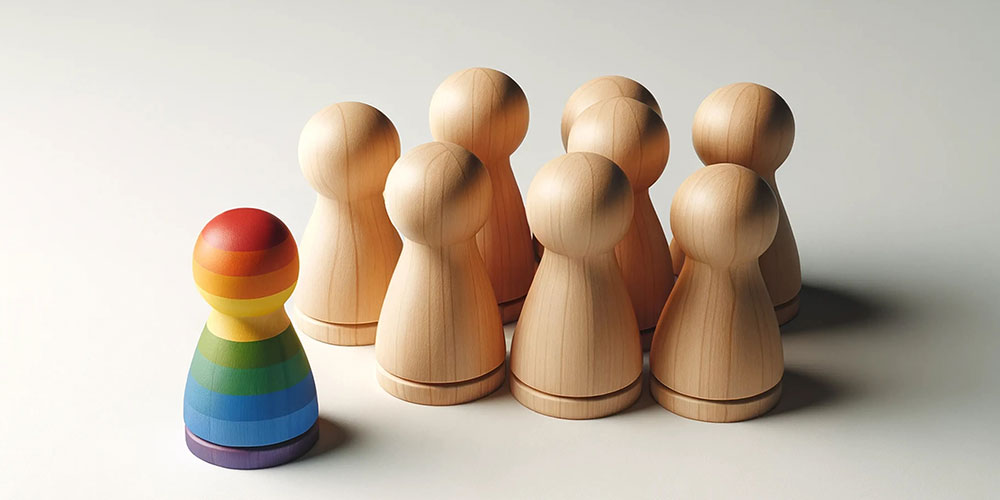Sexual minorities experience greater exclusion in everyday situations
Lesbian, gay and bisexual people experience greater exclusion than heterosexual people. This is the conclusion of a recent study by researchers from the University of Basel and the University of Kaiserslautern-Landau (RPTU). Heterosexual individuals who deviate from traditional gender roles are also affected.
05 June 2024
Lesbian, gay and bisexual people experience exclusion in different areas of everyday life. For example, they are excluded from social activities in the workplace or ignored and marginalized at school or university by fellow students or teachers. Sometimes they are not invited to events or their contributions to discussions are ignored. These were the findings of researchers from the University of Basel and the University of Kaiserslautern-Landau (RPTU).
In three studies with a total of more than 3,200 participants in Germany and the US, the research team investigated sexual minorities and their experience of exclusion. “These groups experience numerous forms of violence and discrimination,” explains Christiane Büttner, a social psychologist at the University of Basel. “Unlike overt discrimination, however, which is both visible and contestable, exclusion can be subtle and therefore difficult to recognize and prove.” This is precisely what makes it difficult for those who experience exclusion to talk about the situation, let alone ask for support.
Lack of research into subtle forms of discrimination
Exclusion can be more painful than other forms of discrimination because it attacks basic needs for belonging, recognition and self-esteem. Humans are social beings and strive for belonging, finding security and affirmation in social groups. Social exclusion can result in serious psychological problems such as anxiety disorders, depression or suicidal tendencies. “The consequences can be devastating, particularly if the excluded individual is aware that they are excluded because of an immutable characteristic, such as their sexual orientation,” says Selma Rudert, a social psychologist at the RPTU.
Previous studies have mainly focused on more overt forms of discrimination against sexual minorities, such as direct verbal abuse. “To date, there has been less research into more subtle forms. We wanted to fill a gap here,” says Büttner.
The results indicated that lesbian, gay and bisexual people experience greater exclusion than heterosexual people. According to the researchers, every person experiences incidents of ostracism an average of two or three times every 14 days, with members of sexual minorities experiencing one more incident on average.
Deviating from genders role leads to exclusion
One of the studies shows that there is more frequent exclusion related to non-conformity with gender roles. “People who are perceived to deviate from gender norms – regardless of whether they actually do so or what their actual sexual orientation is – are more often excluded,” explains Sven Kachel, a psychologist at the RPTU. “Even if respondents were unaware of the sexual orientation of the persons being assessed, they still felt that those they perceived to be less gender-conforming were more prone to exclusion.” This could mean, for example, a heterosexual man who is perceived as less masculine running the risk of exclusion as a subtle form of discrimination.
According to the researchers, the overall results suggest that more proactive measures are needed to raise societal awareness for exclusion as a subtle form of discrimination in all areas. The various campaigns during Pride Month that raise awareness of the concerns of the LGBTQ+ community represent one approach here.
“Organizations and educational institutions should also establish specific programs and training to raise awareness and promote an inclusive environment,” say the study authors. At the societal level, campaigns to promote diversity and inclusion could help to break down stereotypes and prejudices.
Original publication
Christiane M. Büttner, Selma C. Rudert, and Sven Kachel
Ostracism experiences of sexual minorities: Investigating targets' experiences and perceptions by others.
Personality and Social Psychology Bulletin (2024), doi: 10.1177/01461672241240675



